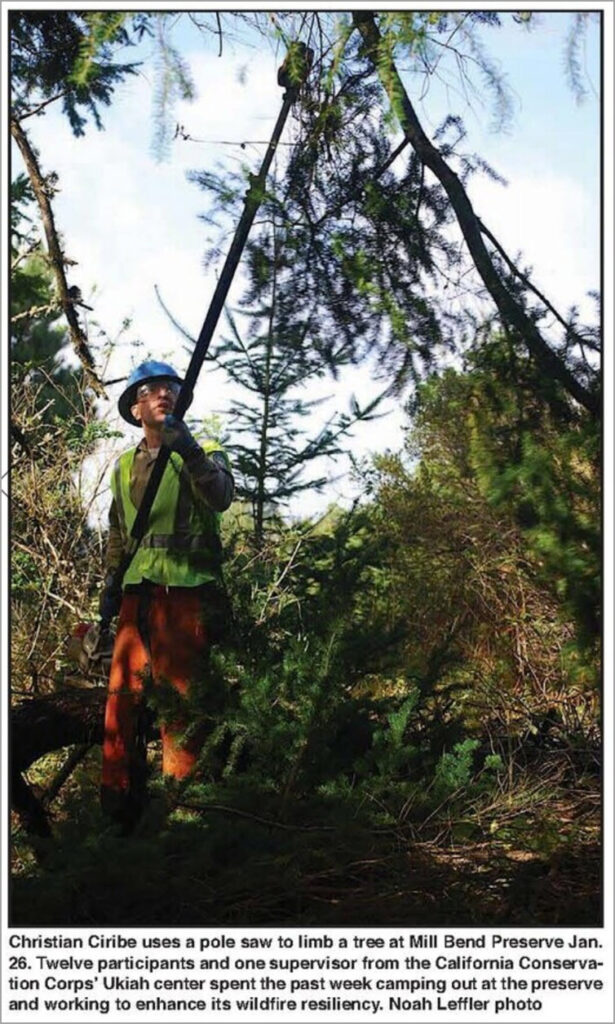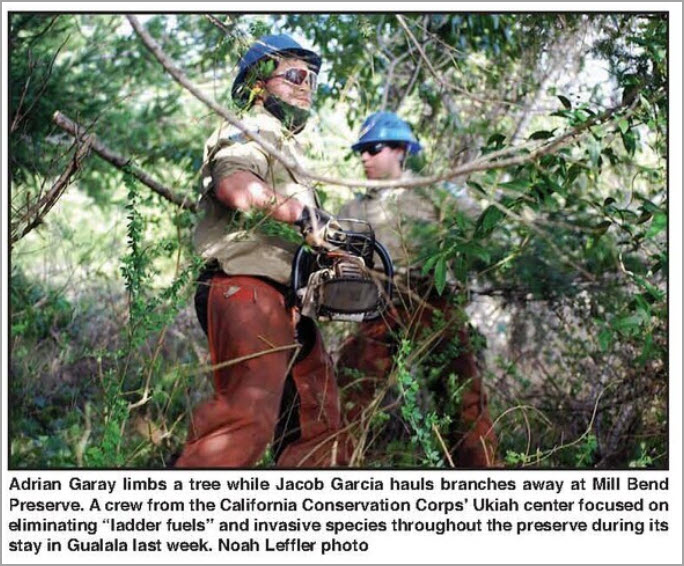Published February 2, 2024
By Noah Leffler
news@mendonoma.com
Copyright Independent Coast Observer
“Hard Work, Low Pay, Miserable Conditions and More!” Such is life for members of the California Conservation Corps, and nowhere does this motto ring more true than on a “spike.” Named after the remote railroad camps of yesteryear, spikes are when Corps members deploy for environmental projects or in response to disasters.
A group of 12 young adults and their supervisor recently made a trip from the Corps’ Ukiah center to Gualala for a week of spike-living at the Mill Bend Preserve, where the hard work and low pay were in abundance. And though some might consider 10-hour days cutting vegetation while living out of tents less-than-austere conditions, the dirt and sawdust-covered crew was more than up to the task when the ICO came to visit.
The spike was the first of two eight-day visits to the preserve, during which the Corps members’ efforts will be focused on making the 54-acre parcel more wildfire resilient. The work, which is being funded by a $307,000 California Coastal Conservancy grant, benefits not only Mill Bend’s landscape, but the neighboring community and Gualala Arts Center as well.
“Wildfire doesn’t know property boundaries,” said Jim Elias, executive director of the Redwood Coast Land Conservancy. “In addition to the wildfire resilience gains we’re going to achieve…it’s improving native habitats for plants, for animals, and it’s really part of the whole restoration effort we’re in the midst of here.”
“[We’re trying] to move forward in time to make the preserve a place we can celebrate nature in and really treat it as a living lab opportunity,” he added. “It’s the early stage of that process, and we’re glad to have the Corps here.”

The first priorities are thinning and reducing fuels at the preserve’s entrance and around its buildings. A follow-up spike next week will target more densely forested portions of the property.
According to project manager Nicolet Houtz, the work will remove “ladder fuels” that can ignite and spread fire to the trees’ canopy.
However, the Corps’ stay in Gualala will entail more than just 80 hours of pruning, chipping and brush removal.
“Part of what they like to do when they’re working on a property such as Mill Bend is learn about the natural environment, the work they’re doing and the reasons behind the work that they’re doing,” she said. “It helps them grow and learn, and they can use those skills and information when they eventually move on from the Corps for future work.”
That future work can include jobs with state and regional parks, the California Department of Fish and Wildlife, CalTrans and Cal Fire to name a few, said Project Coordinator and Conservationist 2 Anthony Burger. “[The Conservation Corps] is a good door to getting into those agencies.”
“It’s a work-learn program,” he added. “We’re kinesthetic — we touch it, feel it, taste it, smell it become one with it.”
His crew wasted no time getting down to business. On just their second day at the preserve, stacks of cut branches and debris lined the main road from the entrance to the cottage. In some spots, what was once a wall of limbs and pine needles even gave way to a view of the Gualala River and beach.
“An oceanside view at work? That’s something I’ve always wanted,” said Marc Martinez amidst the cacophony of chainsaws.
This being his seventh spike, the 21-year-old is no stranger to the outdoor labor and camping. Though the work can be tough, he said his nearly yearlong service in the Corps has been a unique opportunity to branch out from his hometown of Hanford in California’s Central Valley, and he hopes to parlay his experience into a career in environmental science.
Due to Wednesday’s forecasted storms, the crew packed up camp a day early to head back to Ukiah for some well-deserved R&R. In the span of seven days, Corps members were able to cut at least 150 cubic yards of material and pull several more of invasive broom. Their final Mill Bend spike is slated to begin Wednesday, Feb. 7.

